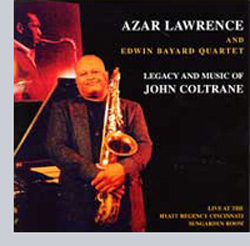 by: Keith Dillon
by: Keith Dillon
"Itís a fact that everything in life is action and reaction. Things evolve, not necessarily consciously. But there are certain elements that are inherent in Jazz, and you must be watching for them. If those elements are there, youíll get it."
This was part of a comment John Coltrane made to the English music journalist Kitty Grime about the nature of improvisation in Jazz. What I take from Traneís comment is that Jazz, like life, is a process of action and reaction. Jazz is, accordingly, in a constant state of flux, but Jazz is also made up of certain basic elements, and when you can hear these elements in music, then the music youíre listening to is Jazz. If I read what Trane said, then it seems to me that there are two key elements in fine Jazz. First, thereís how a musician reacts to a specific song in the moment. Secondly, and I believe every bit as importantly, thereís what the listener hears, and how the listener reacts. Like Theatre, Jazz is ephemeral; itís always changing. Even great recordings canít be heard in precisely the same way by more than one listener, and a listener canít hear a specific recording in precisely the same way more than once. John Coltrane understood this; itís one of the reasons his music is still so compelling.
On Friday, July 27th, the Jazz Bakery in Culver City presented a tribute to the life and music of John Coltrane. The featured musicians were the Azar Lawrence quartet. It doesnít take long to hear the echoes of John Coltrane in their playing, so the Azar Lawrence quartet was well-chosen for this evening. Azar Lawrence is a gifted reed man, for certain, but before I get to him, I must address his rhythm section. This rhythm section was made up of Nat Morgan on piano, Jeff Littleton on bass, and Fritz Wise on drums. I couldnít restrain myself; I told Mr. Lawrence directly that he would be well-advised to keep these gentlemen eating in style for as long as he could. The pianist Nat Morgan was possessed of a quick silver imagination and quick silver fingers to serve his fertile mind. Bass player Jeff Littleton played with the kind of accuracy in the fingers that, until Friday, I thought was only possible on the piano. He didnít so much walk his bass as he took it for a 100-meter dash. And each note he played was clear and resonant. Then there was Fritz Wise on the drums. Like Elvin Jones before him, he understood the nature of micro-rhythms and how to make them ring from his drum set. His drumming was thunderous, like the slam bang of heavy metal drumming, but there was so much more to his playing than just thunder. Mr. Wise lived in the shocking complexity of rippling dotted sixteenth-thirty-second note combinations. Fritz Wise has sprung from the same tradition that gave us great Jazz drummers like Elvin Jones and Tony Williams; he simply must be heard.
The quartet spent the largest part of the evening playing Coltrane standards: Cousin Mary, Equinox, My Favorite Things, etc. The centerpiece of this eveningís tribute, however, was the ground-breaking John Coltrane and Johnny Hartman album. The six songs from the album featured vocalist James Love. Like Johnny Hartman, Mr. Loveís bass-baritone possessed both the weight and the tenderness these arrangements required. I must say, however, that Mr. Loveís renditions of these songs resembled Johnny Hartmanís a bit too closely for my taste. You know the complaint; ďif I wanted to listen to Johnny Hartman, Iíd stay home and put the album on the spindle.Ē This was, more or less, what I heard on Friday. Still, James Love is possessed of enough sweetness and power in his singing, that attention must be paid, and on My One and Only Love, Mr. Love showed a little of what he could do when heís not trying to sound like Johnny Hartman.
Now to Azar Lawrence. Simple as this may sound, Azar Lawrence is an extraordinary saxophone player. Sometimes the truth sounds simpleminded. Mr. Lawrence played both tenor and soprano, and he played both instruments with enough dexterity and fierceness to conjure up memories of his great mentor. Trane himself, of course, was a master of both these instruments, but make no mistake; the ability to play one doesnít necessarily imply the ability to play both. Like Trane, Mr. Lawrence has mastered both these instruments to the degree that he can bend them to his will. He occasionally switched instruments, playing both tenor and soprano in the same number. And simply watching Azar Lawrence is intoxicating. The fury and passion of his music can be seen in his bulging neck as he plays. And the sound he makes is overwhelming; the sound of one man submitting to the will of his God, just the way Trane used to play. What I heard at the Jazz Bakery on July 27th has convinced me that, in LA/Orange County area at least, no one conjures the soul of John Coltrane like Azar Lawrence does. If thereís someone out there thatís better, I simply havenít heard her or him yet.
Azar Lawrence and his quartet will be playing again on September 21st at the Los Angeles County Museum of Art. I wish I could give you more dates, but, unfortunately, azarlawrence.com is not very informative. Nonetheless, keep your ears open and to the ground. Azar Lawrence, and his rhythm section of angels, is worth seeking out.
Share
|
|

